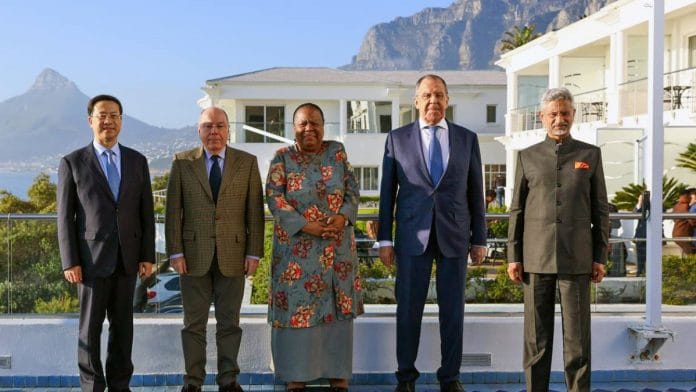New Delhi: The foreign ministers of the BRICS countries have encouraged the use of local currencies in international trade, saying that the world economy has been “complicated by sanctions and boycotts”.
In a joint statement issued Friday at the BRICS (Brazil, Russia, India, China and South Africa) foreign ministers’ meeting in Cape Town, the ministers covered a range of topics from international trade, peace resolutions for the Ukraine conflict and counter-terrorism to energy security, climate change, the situation in Sudan and more.
Like last year, this year’s statement reiterated China and Russia’s explicit support for India, Brazil and South Africa’s aspirations to play a greater role in the UN Security Council (UNSC). India and the other two countries are keen to become permanent members of the UN’s top decision-making body.
In his opening remarks Thursday, External Affairs Minister S. Jaishankar expressed disappointment with the progress of reform in multilateral institutions.
“For two decades, we have heard calls for reform of multilateral institutions, only to be continuously disappointed,” he said, adding that BRICS members must demonstrate “sincerity” in reforming such bodies.
Emphasising the need to strengthen counter-terrorism measures, Jaishankar said, “All nations must take resolute measures against this menace, including its financing and propaganda. It must be combated in all its forms and manifestations and never be condoned under any circumstances.”
In the joint statement, BRICS foreign ministers explicitly rejected “double standards” in countering terrorism and extremism.
Ukraine peace proposals, sanctions
In the joint statement, the foreign ministers referenced the Ukraine war in terms of sanctions and various peace proposals put forth to resolve the conflict.
Without naming countries, the document noted the “impact on the world economy from unilateral approaches in breach of international law and…that the situation is complicated further by unilateral economic coercive measures, such as sanctions, boycotts, embargoes and blockades”.
Since the start of the Ukraine war, Russia has been financially sanctioned by US and other Western nations, including an oil price cap introduced by G7 countries. Russian President Vladimir Putin and other officials have also faced travel bans.
Ukraine’s parliament had also approved sanctions on Iran earlier this week for allegedly supplying Moscow with weapons.
The joint statement also expressed “appreciation” for proposals of mediation and peaceful resolution of the Ukraine conflict through dialogue and diplomacy. This comes as China has been attempting to garner support for its 12-point peace plan released in February this year.
They also touched upon energy security and condemned “terrorist attacks” against critical energy infrastructure.
This comes nine months after the Nord Stream pipelines supplying natural gas from Russia to Germany were bombed, evoking strong reactions from Moscow.
‘Encouraging use of local currencies in trade’
The BRICS foreign ministers also called for greater use of local currencies in international trade.
“Ministers underscored the importance of encouraging the use of local currencies in international trade and financial transactions between BRICS as well as their trading partners,” read the joint statement.
Since the start of the Russia-Ukraine war, countries such as India, Russia and China have begun settling trade in local currencies as opposed to the dollar.
In March this year, Russian lawmaker Alexander Babakov reportedly said this was the first step, with the next being a joint currency among BRICS countries.
In addition, the BRICS foreign ministers welcomed the readmission of Syria into the Arab League last month. In 2011, Syria was suspended from the league over its harsh crackdowns on pro-democracy protests, dealing a big blow to Syrian President Bashar al-Assad at the time.
(Edited by Anumeha Saxena)






